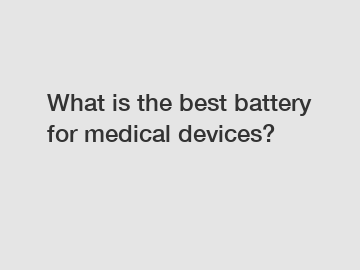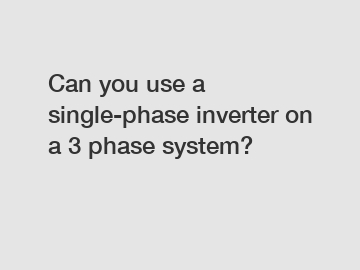What is the best battery for medical devices?
Medical devices have long played a pivotal role in improving patient outcomes and supporting healthcare professionals in delivering quality care. From pacemakers and insulin pumps to portable monitoring devices, these innovative tools have revolutionized the healthcare landscape. However, behind the scenes of every groundbreaking medical device lies a crucial component that ensures uninterrupted functionality - the battery. In this blog, we will delve into the world of medical device batteries, aiming to identify the best choice that aligns with the demanding requirements of these life-saving technologies.
I. Understanding the Power Needs of Medical Devices:
Medical devices, unlike conventional gadgets, are a lifeline for patients and their caregivers. They must be reliable, efficient, and able to run for extended periods of time. Hence, the battery that powers them should align with these critical requirements. Often, medical devices need batteries that offer both high energy density and long-lasting performance.

II. Lithium-ion Batteries: A Primary Choice for Medical Devices.
In recent years, the advent of lithium-ion batteries has transformed the battery industry. These batteries are renowned for their high energy density, low self-discharge rates, and long cycle life. Moreover, they are lightweight, compact, and portable, making them an ideal choice for medical devices that require mobility and ease-of-use.
1. Reliability and Longevity:
Lithium-ion batteries offer exceptional reliability, ensuring that medical devices function optimally even in unpredictable scenarios. With the ability to deliver consistent power over time, these batteries negate the need for frequent replacements, reducing maintenance costs and minimizing downtime for patients.
2. Safety:
Ensuring patient safety is paramount, and lithium-ion batteries excel in this domain. Manufacturers implement stringent safety measures, such as advanced circuitry and thermal management systems, to mitigate the risk of potential hazards like overcharging or overheating. Opting for reputable battery brands further enhances safety and peace of mind.
3. Energy Density:
Energy density refers to the amount of energy a battery can store per unit volume or weight. Lithium-ion batteries boast significantly higher energy density compared to their predecessors, offering medical devices extended operation time. This is crucial for devices such as implantable defibrillators or insulin pumps that need to function seamlessly for extended periods.
Additional reading:Diaphragm Pump 2 Inch: Electric vs Gasoline Models Compared
How to Safely Treat Wastewater at Home: Top Methods Revealed!
Revolutionizing Agriculture: Electric Diaphragm Pumps Worth Investing?
Revolutionizing Industrial Processes: Ductile Iron Diaphragm Pump - Worth the Investment or Overhyped?
How does a piston pump operate in a packaging machine?
Running a Diaphragm Pump Dry: What You Need to Know
What are the benefits of a piston pump water system?
III. Cutting-Edge Innovations: Solid-State Batteries.
While lithium-ion batteries have dominated the battery market, breakthrough technologies are emerging, promising even greater advancements in medical device performance. Solid-state batteries have garnered significant attention due to their potential to overcome the limitations of traditional lithium-ion batteries.
1. Enhanced Safety:
Solid-state batteries utilize solid electrolytes instead of the flammable liquid electrolytes found in lithium-ion batteries. This eliminates the risk of leakage or thermal runaway, thus ensuring a higher degree of safety. In the world of medical devices, solid-state batteries demonstrate immense potential, especially for implantable devices where safety considerations are critical.
2. Superior Energy Density:
Solid-state batteries have the potential to offer higher energy density than lithium-ion batteries. This means longer-lasting power for medical devices, resulting in decreased downtime for patients and improved efficiency for healthcare providers.
IV. Looking Ahead: Advancements and Future Developments.
As technology advances, the demand for smaller, more efficient, and longer-lasting batteries for medical devices will continue to grow. Several emerging technologies, such as graphene batteries, lithium-air batteries, and microbatteries, hold the promise to revolutionize the landscape further. These advancements, coupled with ongoing research and development, will pave the way for medical devices with unparalleled capabilities and power autonomy.
Conclusion:
The importance of choosing the right battery for medical devices cannot be overstated. Lithium-ion batteries, with their proven reliability, safety, and energy density, remain the primary choice for most applications. However, as technology continues to evolve and newer battery technologies emerge, such as solid-state batteries, the future looks promising for even more efficient and advanced medical devices. With the power of innovation, our collective goal should be to ensure that the batteries powering these life-saving devices fulfill their potential, ultimately reshaping the future of healthcare.
The company is the world’s best Hybrid AC coupled inverter, High-quality single phase string inverter, military hybrid storage inverter supplier. We are your one-stop shop for all needs. Our staff are highly-specialized and will help you find the product you need.
Additional reading:Top 7 Wire And Cable Manufacturers in The World
Three-phase inverters: what, how, and why? ...
Lots of questions on grain air pump systems?
Do you need a 3 Phase Solar Inverter?
10 Questions You Should Know about Diaphragm Pump Troubleshooting
What is the importance of a pneumatic pump definition?
What is a hybrid inverter - Clean Energy Reviews
171
0
0
Related Articles
-
147
0
0
-
148
0
0
-
140
0
0
-
133
0
0
-
134
0
0







Comments
All Comments (0)